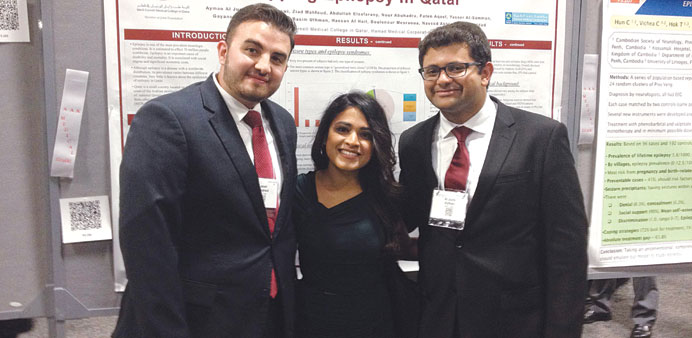Three graduate doctors from Weill Cornell Medical College in Qatar (WCMC-Q) have presented their research at one of the world’s foremost international neurology conferences.
Dr Mais Alkawaz, Dr Ayman al-Jurdi and Dr Mujahed Laswi presented their research posters at the 2015 annual meeting of the American Academy of Neurology in Washington DC.
The newly-qualified physicians were still students when they presented their research at the conference, which took place shortly before their graduation ceremony.
Dr Naim Haddad, associate professor of Clinical Neurology at WCMC-Q, said: “This is one of the largest and most important events in neurology and it is attended by many of the world’s most highly regarded neurologists, so this was an incredible opportunity for the
students.”
“Presenting their projects in Washington DC marked the culmination of a year of very hard work carrying out clinical research at Hamad Medical Corporation (HMC), which delivered very interesting and worthwhile results. They showed great confidence and displayed excellent knowledge of their research when discussing their posters with the neurologists and served as excellent ambassadors for WCMC-Q.”
Dr Mais Alkawaz presented a research poster on her project about idiopathic intracranial hypertension in Qatar, a rare and serious disease characterised by increased pressure around the brain that causes headaches and nausea which can lead to loss of vision if not treated.
The project was supervised by Dr Marc Dinkin, director of Neuro-Ophthalmology at NewYork-Presbyterian Hospital - Weill Cornell Medical Centre, and Dr Fatima al-Mannai, specialist ophthalmologist at HMC.
Dr al-Jurdi and Dr Laswi worked together on a project that mapped the incidence of epilepsy in Qatar and made useful discoveries about the most likely causes of the disease among different nationalities. By studying the charts of several hundred HMC patients, the project found that those of South East Asian origin were more likely to have developed epilepsy due to infectious diseases affecting the brain, while among the Qatari population, stroke was more commonly the cause.

Dr Mujahed Laswi, Dr Mais Alkawaz and Dr Ayman al-Jurdi.
